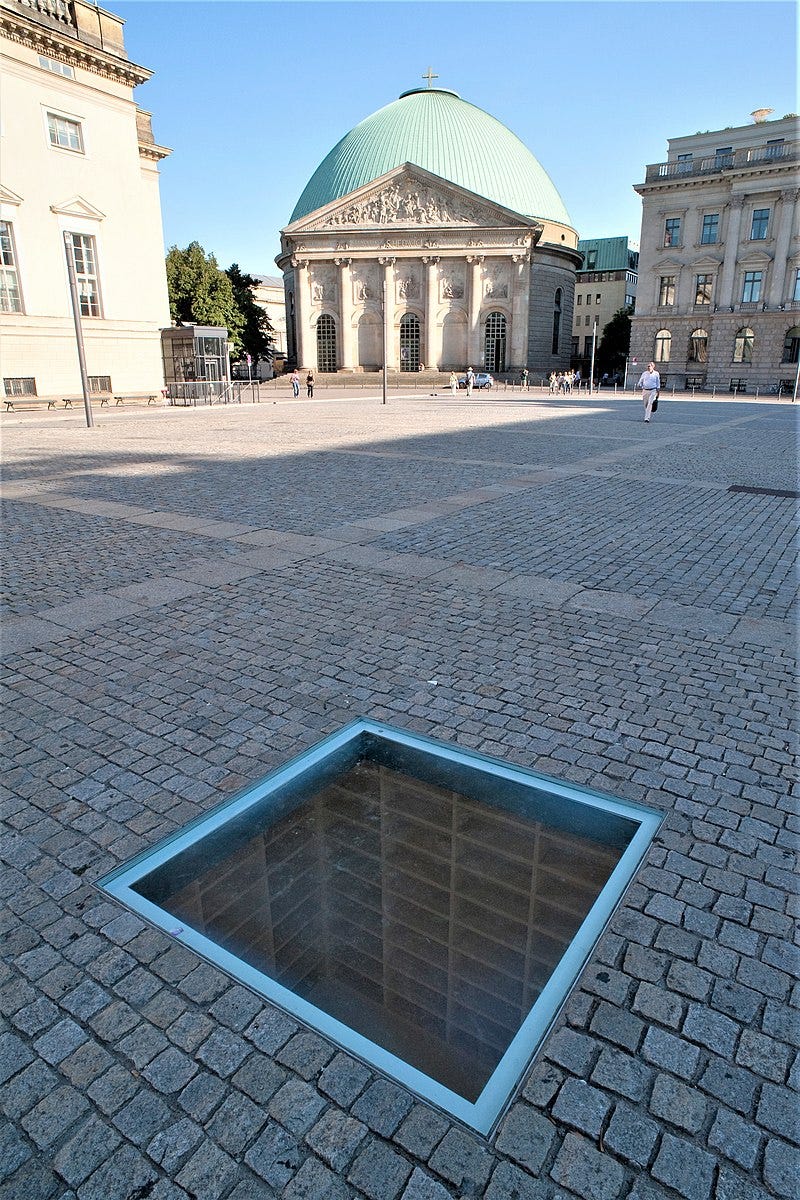
Autodafé in Berlin.
On the night of May 10, 1933 over 20,000 books were destroyed by fire. on the Bebelplatz Square in Berlin. Joseph Goebbels, Minister of Education and Propaganda of the Nazi government directed this autodafé. German books whose content was contrary to Nazi ideology were burned. 1
Included among the books burned:
The works of traitors, emigrants and authors from foreign countries who believe they can attack and denigrate the new Germany.
The literature of Marxism, Communism and Bolshevism.
Literature with liberal, democratic tendencies and attitudes.
All historical writings whose purpose is to denigrate the origin, the spirit and the culture of the German Volk, dissolve the racial and structural order of the Volk, or that denies the force and importance of leading historical figures in favor of egalitarianism.
Books that advocate "art" which is decadent, bloodless, or purely constructivist
Writings on sexuality and sexual education which serve the egocentric pleasure of the individual and thus, completely destroy the principles of race and Volk.
Literature by Jewish authors,
Popular entertainment literature that depicts life and life's goals in a superficial, unrealistic and sickly-sweet manner based on a bourgeois view of life;
Pornography and explicit literature
Books degrading German purity.
Library of Burned Books.
On 10 May 1934, one year after the mass book burnings, the German Freedom Library founded by Alfred Kantorowicz was opened to assemble copies of the books that had been destroyed. These included authors such as Walter Benjamin, Franz Boas, Joseph Conrad, Fyodor Dostoyevsky, Theodore Dreiser, Albert Einstein, Friedrich Engels, F. Scott Fitzgerald, Sigmund Freud, André Gide, Ernest Hemingway, Hermann Hesse, James Joyce, Franz Kafka, Georg Lukács, Rosa Luxemburg, Karl Marx, Robert Musil, Vladimir Nabokov, Joseph Roth, Leo Tolstoy, H. G. Wells, and Franz Werfel.2
The Empty Library, Versunkene Bibliothek
In 1995 Micha Ullman installed Versunkene Bibliothek, the Empty Library on the Bebelplatz Square in Berlin. The transparent glass plate shows a succession of empty shelves. The memorial also presents a quote from poet Heinrich Heine, engraved on the plaque itself: “Where you burn books, you end up burning men”3
Dumont, Montaine (2020) Micha Ullman’s Empty Library: An Ode to Culture. Daily Art Magazine. Wolfgang Herrmann was the German librarian and member of the Nazi Party, whose blacklist provided the template for the Nazi book burnings in May 1933.
Kantorowicz, A. (1944). Library of the Burned Books. The New Republic, 110(20), 686-688.
Dumont, Montaine (2020) Micha Ullman’s Empty Library: An Ode to Culture. Daily Art Magazine.




"Totalitarian leaders have one trick up their sleeve that intellectuals have struggled to understand; that is, they are deadly serious."--Paul Hollander
While we celebrate the fact that we recognize the horror of the Nazi destruction of books, I think it's important to remember that there are still a great many people who are trying to prevent people (especially young people) from having access to important books. The number of book banning incidents in the U.S. today is really frightening. It is something that librarians, and all of us, have to fight against constantly.